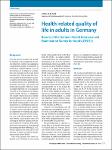Health-related quality of life in adults in Germany
Results of the German Health Interview and Examination Survey for Adults (DEGS1)
Ellert, Ute
Kurth, Bärbel-Maria
The aim of this study is to describe health-related quality of life (HRQoL) of the German adult population and provide current representative normative data for the version 2 of the SF-36 (SF-36V2) in the German population. In the German Health Interview and Examination Survey for Adults (DEGS1) the SF-36V2 was used to measure health-related quality of life. Men report in all areas better HRQoL compared to women; a lower social status is associated with lower HRQoL values. Having one or more chronic diseases is associated with lower values in all dimensions of HRQoL. Compared to 10 years ago, the general health seems to be much better in women aged 40–49 years and older and in men aged 50–59 years and older. Version 2 of the SF-36 has proved to be a robust instrument of health-related quality of life that is able to plausibly map differences regarding sociodemographic and health characteristics.
No license information

